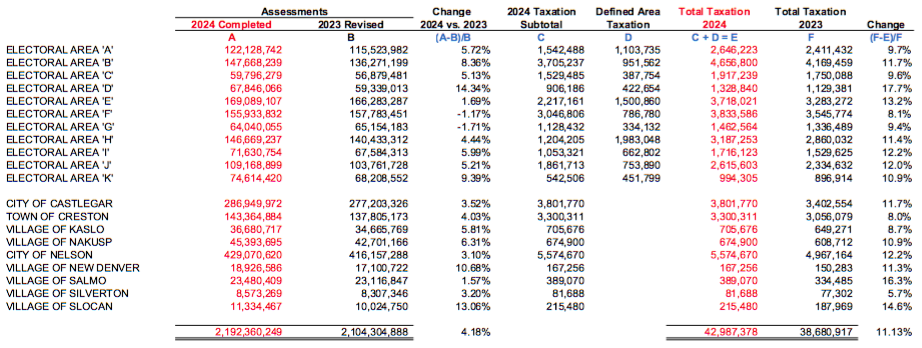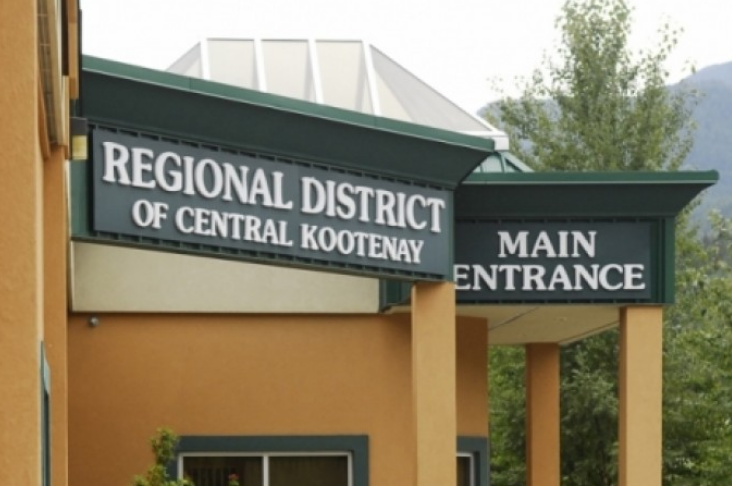Update: two asks and paying 21 per cent of the budget in store for RDCK’s two cities
The regional district could be asking for over 11 per cent more from its major municipalities when taxation time comes knocking in spring, according to the 2024 financial plan projections.
In a special board meeting on Jan. 19 the Regional District of Central Kootenay board of directors had the first glimpse of the financial wish list — the 2024 draft financial plan — with two asks for additional staff positions.
Although the average increase for the 11 electoral areas (rural) and nine member municipalities was 11 per cent across the board, the city of Nelson’s 3.1 per cent average assessment increase was met with a proposed 12.2 per cent hike in taxation, and Castlegar’s 3.52 per cent assessment increase was paired with a projected 11.7 per cent taxation rise.
That means Nelson will pay approximately $5.57 million of the $42.99 million RDCK budget — around 13 per cent — with Castlegar chipping in $3.8 million (eight per cent). Electoral area B (Creston rural) will pay the second most of the RDCK members at $4.7 million, while Area F is just ahead of Castlegar and pays the third most at $3.83 million.
The $38.7 million the RDCK drew in its budget for 2023 has jumped to $42.99 in the draft plan for 2024, despite a BC Assessment property assessment for the entire RDCK rising by only a 4.18 per cent average.
The biggest change in taxation proposed for this year is in Area D, which could see a 17.7 per cent increase, followed by a 16.3 per cent increase for the Village of Salmo.

During the special meeting, it was noted that inflation was the main culprit in driving taxation upwards, as well as some supply chain concerns, impacting several services and projects.
“An an increase in interest rates will continue to put pressure on both short-term and long-term borrowing costs with a partial offset from increased investment income,” said RDCK chief financial officer, Yev Malloff, during the meeting.
Taxation figures for electoral areas and municipalities only include regional district taxes, and do not reflect the entire tax bill that includes provincial taxes — hospital, school district, Municipal Finance Authority — and municipal tax in the municipalities.
In the upcoming months the RDCK will host public information sessions — in-person and online — through February and March, allowing people the opportunity to understand how the budget impacts the electoral areas and municipalities.
The regional district will have the final budget approved at the March 21 board meeting, sending the document to the provincial government for further approval by March 31.
Table for two
The case for two additional staff members was made at the same meeting, with one proposed for regional parks operation and another emergency management coordinator.
The regional parks position (up to $125,000) would be for someone to “effectively plan and complete new capital and preventative maintenance projects, monitor contractor/employee performance, usage and respond to unplanned work (vandalism).”
“Increasing our Parks maintenance workers will allow our regional parks manager and regional parks operations supervisor to do their higher level work,” said RDCK operations and asset management regional manager Craig Stanley.
The RDCK operates 24 regional parks and three regional trails. It currently has two full-time staff in parks operation — the manager and the supervisor — who work year round. The seasonal parks operations team includes a total of 0.76 full-time equivalent (FTE) for the entire year, spread across the various parks services.

“A lot of the work done during the parks’ busiest months is project-based — asset improvement and construction. The window could be expanded to allow for the improvement work to be done during the shoulder spring and fall instead of during the busy tourist season,” said Stanley.
The additional full-time emergency program coordinator ($103,625) would be for the Nelson office, joining the existing coordinator.
“The primary responsibilities of this position are to lead emergency preparedness, response, and recovery by liaising with outside agencies, external contractors, volunteer organizations, and RDCK staff to ensure implementation and improvement of emergency plans and training,” said Dan Séguin, RDCK manager of Community Sustainability.
Currently, the RDCK has two emergency program coordinators, one in Nelson and one in Creston, who share various local and regional functions.
“Prior to the climate-driven changes to the hazard landscape, and before the new legislation, the current workload for both EPCs positions was already stretched to capacity given their current responsibilities and tasks,” said Séguin.
Note: updated from an earlier story.






















